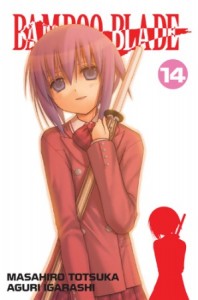By Yumi Unita. Released in Japan as “Usagi Drop” by Shodensha, serialized in the magazine Feel Young. Released in North America by Yen Press.
Please do not discuss Bunny Drop beyond Vol. 6 in the comments. At all.
When I reviewed Vol. 5, I noted that I couldn’t wait to see what direction Unita would take things, even though I thought it would make me cringe. And I was 100% correct – this entire volume is like a giant train wreck, where both of the main ‘ships’ we could be rooting for are faced with tortured reality.
Last time around, we had been told about Kouki’s ‘bad boy’ period in middle school, and now we get to see it in the form of an extended flashback. Which is good, as it really gives us insight as to why Rin has decided that she’s no longer ‘romantically’ inclined towards him. The two of them walked that fine line between ‘like brother and sister’ and small crush last time, but seeing Akari’s wholehearted efforts to drive Rin away, you can’t help but feel horrible for her. Cyber-bullying isn’t just an American thing.
This is paralleled with the ongoing not-relationship between Daikichi and Kouki’s mother, who still doesn’t have a first name (and likely never will, sadly). Their conversation at the end of the volume is all about wishing things could be different but having to move forward anyway, and it almost feels like Nitani-san cares about Daikichi too much to get involved with him. They’ve been there for each other in order to raise their children, but this has perhaps led both of them to be too self-sacrificing – Nitani-san is marrying someone else so that Daikichi can move on and find anotehr as well. The whole scene is heartbreaking.
Rin and Kouki aren’t as sad, but they’re equally hemmed in by feelings that things have moved beyond a point where everyone can go back to how it was before. This is helped, of course, by Akari, who Rin confronts when she tricks Kouki into thinking she’s pregnant. There’s a nice effort to show Akari’s side of things, which isn’t sympathetic at all, but it’s quite understandable – and mercenary. Akari wants to be her own woman, and if that means abusing the love of a gullible high schooler for money, well hey. Unfortunately, all this seems to have done is shown Rin that she needs to get over Kouki, and she tells him so – though notably getting over him is not as simple as she thinks, judging by her red-eyed face the next day.
We all make bad choices in life, and wish that we could turn back the clock and do things better. But we can’t, and that’s what this volume is all about. There’s no going back in time so Nitani could meet Daikichi when she was younger. There’s no do-overs so Kouki isn’t sucked in by Akari’s schemes. And sometimes you can’t fix things, and you have to accept it and move on. Which is where we are now in this series that, while it still has a lot of quiet and cute moments, has come an awful long way from the saga of a young guy raising an adorable daughter.





 KATE: After several lean weeks, the
KATE: After several lean weeks, the  SEAN: Tempted as I am to go with one of my many light, fluffy comfort manga which will no doubt make me smile more, I have to admit that the pick of the week is going to be
SEAN: Tempted as I am to go with one of my many light, fluffy comfort manga which will no doubt make me smile more, I have to admit that the pick of the week is going to be  MICHELLE: I am completely on board with both Chi’s Sweet Home and Message to Adolf—I was fortunate enough to be able to read the old VIZ editions via inter-library loan a couple years ago—but I would be remiss if I did not voice my squee at a new volume of Yuu Watase’s
MICHELLE: I am completely on board with both Chi’s Sweet Home and Message to Adolf—I was fortunate enough to be able to read the old VIZ editions via inter-library loan a couple years ago—but I would be remiss if I did not voice my squee at a new volume of Yuu Watase’s  MJ: After all that, I hardly know what to choose! I’ll be anxiously digging in to all three of my colleagues’ picks as soon as I can get my grubby little hands on them, but with such a bounty shipping in this week, I feel I should take the opportunity to spotlight another title. So in the end, I’ll give my nod to volume eight of Natsume Ono’s
MJ: After all that, I hardly know what to choose! I’ll be anxiously digging in to all three of my colleagues’ picks as soon as I can get my grubby little hands on them, but with such a bounty shipping in this week, I feel I should take the opportunity to spotlight another title. So in the end, I’ll give my nod to volume eight of Natsume Ono’s 





